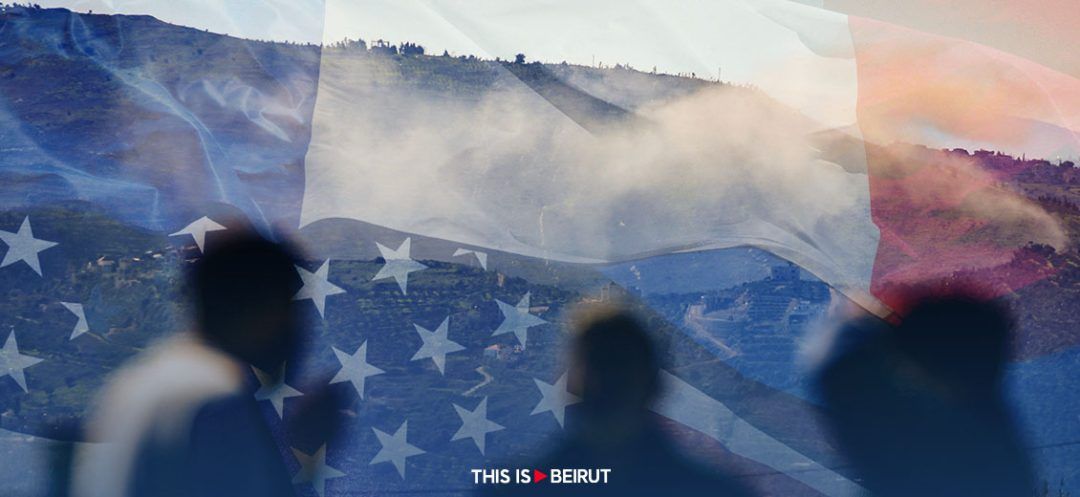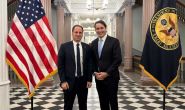- Home
- War in the Middle East
- The West Prioritizes Lebanon’s Dissociation From Gaza…

Contrary to what is being said in the “Resistance” milieu—as stated by Hezbollah Secretary General Hassan Nasrallah, garnering Lebanon’s official approval by way of its caretaker Prime Minister Najib Mikati—when it comes to linking Lebanon’s fate to Gaza’s, Arab and Western envoys visiting Lebanon (some in private for security reasons) seek to dissociate the country from the war in the occupied territories. They also endeavor to draw a line between the presidential deadline and the events unfolding in the region, awaiting a solution, one that will nonetheless not come soon.
However, while positive efforts are made regionally and internationally to that end, there are still several obstacles standing in the way, chief among them Israel’s refusal of the two-state solution.
According to certain information leaked by a European official to a Lebanese politician, “A French-American initiative has been launched to promote cooperation towards solving the Lebanese crisis and electing a president so that institutions can operate again. But to achieve this goal, the events occurring in the South must be dissociated from the war in Gaza.” Additionally, Paris is trying to capitalize on the extension of Army Commander-in-Chief Joseph Aoun’s mandate to have a president elected soon. The same information indicated that the cooperation between France and the US was highlighted by the meeting between American Special Presidential Coordinator for Global Infrastructure and Energy Security, Amos Hochstein, and two French officials specialized in the Lebanon dossier.
The meeting in question was held in Paris before Hochstein arrived in Beirut and was aimed at finding ways to launch a joint initiative and set up a roadmap to facilitate the presidential election, form a government and begin to implement reforms. The plan would then be shared with the ministers of the Quintet (France, KSA, Egypt, Qatar, USA) whose meeting will be held in Paris or Riyadh. That is why the Saudi Ambassador to Lebanon, Walid al-Bukhari, has put effort into strengthening cooperation with representatives of the Group of Five before their upcoming session. It appears that many proposals are being presented in Qatar by the warring parties to find a solution to the conflict.
No details pertaining to Hochstein’s brief meetings in Lebanon were disclosed. The American envoy met with Parliament Speaker Nabih Berri, caretaker Prime Minister Mikati, Army Commander Joseph Aoun and interim General Security General Director, Major General Elias al-Baysari.
In a televised interview conducted in Davos, Mikati assured that “an American initiative was shared with us, although no details were revealed. We are committed to pursuing negotiations in order to find a diplomatic solution through the implementation of Resolution 1701.” He added, “I cannot disclose details about the initiative in question.” Berri also refrained from stating anything. Information shared by sources close to the Shiite duo showed that the Amal movement is currently in negotiations with Hezbollah as far as the initiative is concerned.
Although Hochstein remained silent about his initiative—to ensure its success—several political sources were able to leak its main ideas, which include “de-escalation in the South and a reduction of military operations against Gaza as a first step towards a ceasefire.” The de-escalation should be coupled with measures to implement Resolution 1701, if incrementally; the buffer zone should be seven kilometers deep, and no armed factions are to operate in it as a first step. The Resolution also stipulates that the Lebanese army and UNIFIL would be in charge of security in that area until the issue of the 13 points of contention is solved—and it is yet to be determined whether they belong to Lebanon or Syria—from point B1 in Naqoura to Kfarchouba and the Shebaa Farms.
According to some information, Hochstein prioritized Resolution 1701 over Resolution 242, which covers the Shebaa Farms. Speaker of Parliament Nabih Berri and Prime Minister Najib Mikati insisted that adjudication concerning the Shebaa Farms not be postponed and that negotiations should cover all the southern border so that Israel does not consider the temporary to be permanent. In a similar context, the Israeli newspaper Yehioth Ahronoth published information indicating that “Israeli military leaders are proposing a 48-hour truce in the North of Israel, in cooperation with Washington.”
Following Hochstein’s visit and political convergence towards the extension of Aoun’s mandate, members of the opposition suggested to Berri that this convergence move in the direction of the presidential deadline. Berri replied by saying, “Sleiman Frangieh is the only candidate capable of managing the dossier after Gaza, and he would not stab the resistance in the back.” According to certain observers, this position is a message to foreign countries, more so than to Lebanon itself. Sources close to Frangieh believe that his chances as future president when the war in Gaza ends are high, and that it is the reason why he decided to extend his activities abroad. All this is in contradiction with information from Paris and the Quintet indicating that a search is underway for a third consensual candidate and that there is no room for a president who would defy the resistance. That is precisely the reason why officials are awaiting the return of Le Drian, expected to visit Lebanon in early February after the Quintet meeting during which a roadmap will be discussed and tentatively marketed by France.
In parallel with Hochstein’s visit, information shows that “the resistance forces, which include the Shiite duo and Iran, did not reject the American proposal carried by Hochstein. But talks are underway to improve conditions, according to Hezbollah Secretary General Hassan Nasrallah, who discussed this topic recently. In his last speech, Nasrallah stressed that the liberation of every inch of occupied land will be the work of the resistance alone, as this will reinforce his authority internally and give him leeway externally—as the guardian of safety and stability in the South of Lebanon and the North of Israel, through the land border delimitation and the resolution of the conflict surrounding it. Only then will the army and UNIFIL take up the responsibility of implementing Resolution 1701.”
Read more



Comments